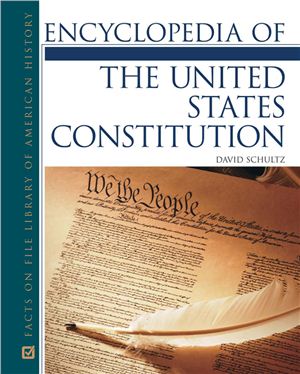Facts on File, 2009. - 923 pages.
The U.S. Constitution established a federated republic in the United States, which was structured according to a separation of powers - executive, legislative, and judicial - each with its own specific duties and powers. In more than 700 entries, "Encyclopedia of the United States Constitution" contains all the material high school students need to understand the United States Constitution. This new two-volume A-to-Z set covers the people, court cases, historical events, and terms relating to one of the most studied political documents in schools across the country. Appendix material includes the U.S. Constitution and other govement documents. Entries of this title include: affirmative action; capital punishment; citizenship; confirmation process; cruel and unusual punishment; double jeopardy; eleventh amendment; fourth amendment; freedom of the press; gun control; impeachment; jury nullification; national security; planned parenthood v. Casey; presidential immunity; privacy; property rights; religion and free speech; same-sex marriage; school choice; state action; terrorism control; war powers; workplace harassment; and many more.
The U.S. Constitution established a federated republic in the United States, which was structured according to a separation of powers - executive, legislative, and judicial - each with its own specific duties and powers. In more than 700 entries, "Encyclopedia of the United States Constitution" contains all the material high school students need to understand the United States Constitution. This new two-volume A-to-Z set covers the people, court cases, historical events, and terms relating to one of the most studied political documents in schools across the country. Appendix material includes the U.S. Constitution and other govement documents. Entries of this title include: affirmative action; capital punishment; citizenship; confirmation process; cruel and unusual punishment; double jeopardy; eleventh amendment; fourth amendment; freedom of the press; gun control; impeachment; jury nullification; national security; planned parenthood v. Casey; presidential immunity; privacy; property rights; religion and free speech; same-sex marriage; school choice; state action; terrorism control; war powers; workplace harassment; and many more.

